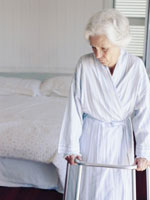
Depression often looks different in older adults and the elderly than it
does in younger people, according to Brent Forester, MD, a geriatric
psychiatrist at McLean Hospital in Belmont, Mass.
Older people tend to focus more on physical symptoms and less on
emotional ones. Slow speech and a lack of attention to personal appearance may
also be tip-offs to depression.
"The classic case is a widowed lady who isn't sleeping well and has
lost weight," he says. "And she's not saying she's depressed. Her
chief complaint is that she's nervous all the time and worried about her
health. Her back hurts, she has headaches and stomach problems."
Symptoms at a
glance
Disturbed mood
• Sadness,
discouragement, crying
• Anxiety,
panic attacks, brooding, irritability
• Say
they feel sad, blue, depressed, low, nothing is fun, down in the dumps
Disturbed
perception
• Loss of
ability to experience pleasure
• Withdrawal
from usual activities
• Feelings
of worthlessness
• Unreasonable
fears
• Feelings
of guilt, including self reproach for minor failings
• Delusions
(false fixed beliefs that are characteristic of "psychotic"
depression)
• Hallucinations
(false sensory experiences that characteristic of "psychotic"
depression)
Behavioral
changes
• Increased
or decreased body movements (e.g., psychomotor agitation or retardation)
• Pacing,
wringing their hands, pulling or rubbing their hair, body, or clothing
• Sleep
disturbance: difficulty getting to sleep, staying asleep or especially waking
up early
• Changes
in appetite: usually loss of appetite but sometimes increased appetite
• Weight
loss or occasionally weight gain
• Fatigue,
decreased energy
• Preoccupation
with physical health
• Believing
they have cancer or some other serious illness when they don't (called somatic
delusions)
• Difficulty
concentrating, thinking or making decisions
• Slowed
speech, slowed responses with pauses before answering, decreased amounts of
speech, low or monotonous tones of voice
• Thoughts
of death or suicide or suicide attempts
• Constipation
• Unusually
fast heart rate
Depression versus grief
Symptoms of depression are often a normal reaction to
loss in the elderly, says Kathleen Buckwalter, PhD, RN, professor of
gerontological nursing research at the University of Iowa. "When older people
lose a friend or relative, they cry, they feel sad, they feel lost, and lonely,
out of sorts, or like there's no point in going on," she says. They may
even lose their appetite, lose weight, and develop insomnia. These are normal
responses.
However, if grief triggers severe feelings of
worthlessness, psychomotor retardation (slowing of movements and thoughts),
psychotic symptoms (delusions or hallucinations), or impairment in their
ability to function, it is critical to seek professional mental health help.
Depression masquerades as illness
Symptoms such as extreme fatigue and sluggishness,
frequent headaches and stomachaches, and chronic pain can be symptoms of other
serious diseases. But they're also common symptoms of depression in older
adults.
If you experience these or similar symptoms—or if an
older loved one exhibits these symptoms—ask a doctor to test for depression.
Other signs of depression include feeling nervous, empty, worthless, irritable,
restless, unloved, or uninterested in activities, pursuits, or people you used
to enjoy.
Some older people experience dysthymic
disorder, sometimes called minor depression. It may be called minor, but as
with full-blown depression, it can have a serious impact on your life. Minor
depression can also worsen and become full-blown depression.
health.com
Please share
No comments:
Post a Comment